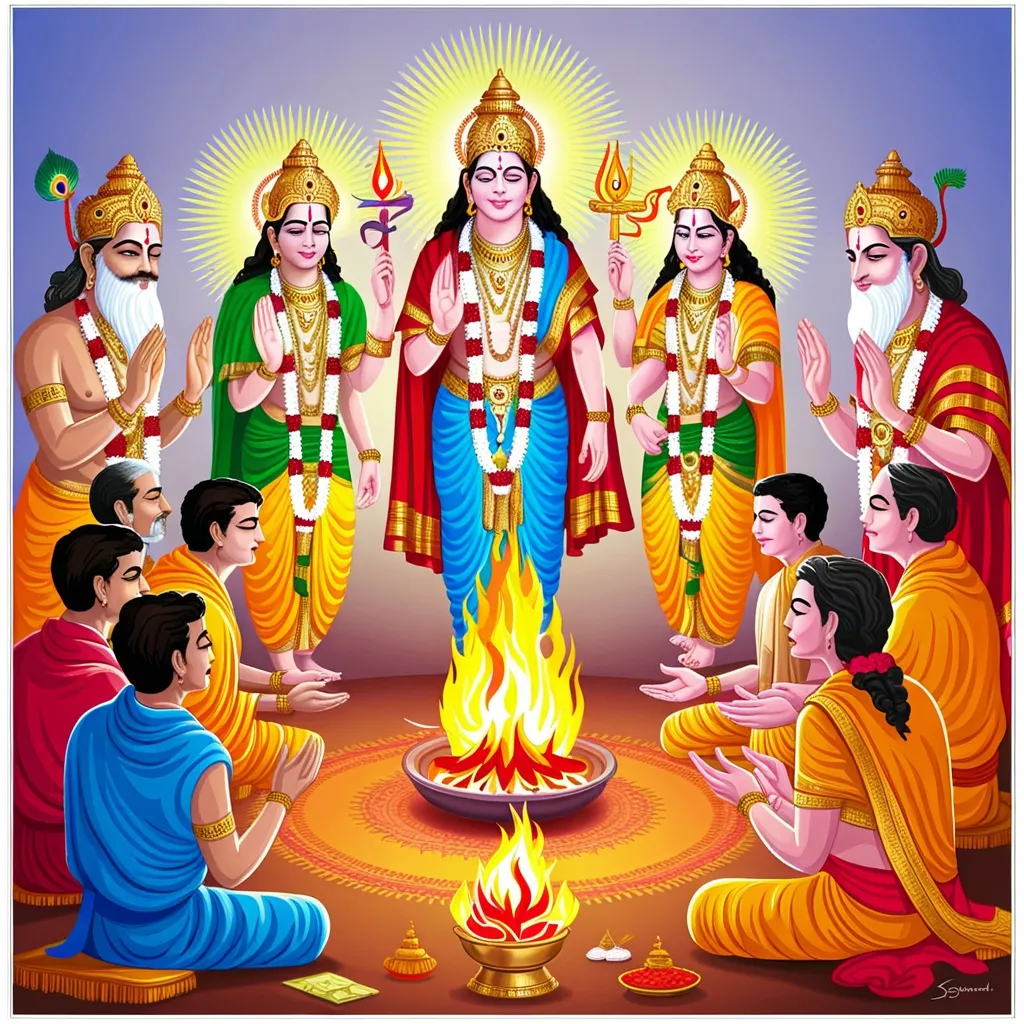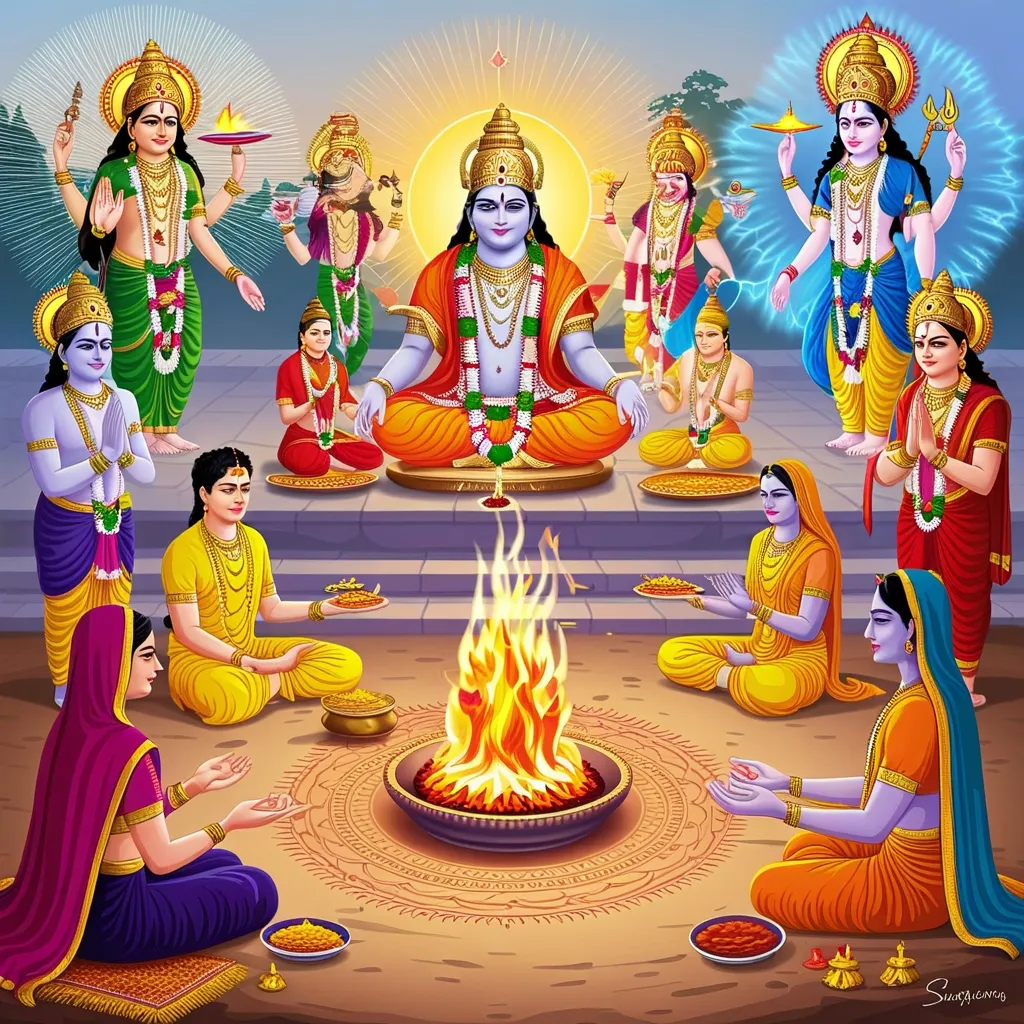In the rich and profound world of Hindu scriptures, the Yajurveda takes a special place, standing tall as a vital source of ritual and spiritual wisdom. Being one of the four primary Vedas in Hinduism, it’s not just a collection of ancient texts but a cornerstone for invoking divine blessings that can guide us in finding purpose and living a fulfilling life. So, let’s dive into the depths of Yajurveda and get a clearer picture of how its powerful mantras bring divine blessings into our lives.
The Heart of Yajurveda
Originating from the Sanskrit words “Yajus” and “Veda,” meaning “knowledge of sacrifice,” Yajurveda is all about sacrificial rites and offerings. These ancient scriptures are packed with prose mantras that priests chant during various ceremonial rituals. These mantras transcend mere words – they are potent invocations that act as a direct line connecting us to the divine realm.
Mantras Designed for Divine Gratification
Central to Yajurveda is the focus on invoking divine blessings. These mantras aren’t just for show. They are carefully designed to seek the benevolence of numerous deities, paving the way for the devotee to achieve well-being, prosperity, and spiritual evolution.
Take the Agneyam Yagnyamaadhvaram Mantra from the Krishna Yajur Veda, for instance. This one’s a powerful plea to Agni, the fire god. Recited with the desire to gain intelligence, wealth, health, and long life, this mantra is like a heartfelt request for a bountiful life. It wraps up beautifully with the words, “Shanno Bhavantu Vaaje Vaaje,” signifying, “May all be well with us.”
Another notable mantra is the Ashyaamatam Kamam from the Rigveda. Practitioners chant this for fulfilling desires, gaining wealth, and amassing energy. Found in the Rigveda’s Mandala 6, Sukta 5, and Mantra 7, it calls upon Agni for prosperity and energy, typically used in special yagya rituals like Kamya Ishti.
Calling Upon Deities
Mantras in the Yajurveda often invoke different gods and goddesses to bestow their blessings. The Taittiriya Samhita, for instance, includes verses that beckon Savita, the sun god, to spark rituals that lead to good fortune and strength. These mantras are a vivid display of the intimate bond between divine and human efforts.
Rituals and Their Significance
Yajurveda is inextricably linked with ritualistic practices. During ceremonies like the Agnicayana, priests utter specific mantras to call upon the gods. These verses, set in a rhythmic meter, are crucial to the successful completion of the ritual. For instance, parts of the Taittiriya Samhita contain chants that urge the ritual forward, seeking good fortune and purifying thoughts.
Philosophical Wisdom
Beyond the ritualistic aspect, Yajurveda mantras are soaked in deep philosophical insights. The Isha Upanishad, part of the Yajurveda, serves as a profound philosophical guide. It explores the nature of the Self (Atman), stating that realizing the oneness of all beings within the Self dispels doubt and confusion. This mantra underlines the unity and interconnectedness of life.
In Everyday Life and Personal Growth
Yajurveda mantras aren’t reserved only for grand rituals. They seamlessly integrate into daily life too. For example, chanting “O God, lead us from untruth to truth. Lead us from the darkness of ignorance to the light of knowledge and wisdom. Lead us from death to immortality,” acts as a powerful invocation for spiritual growth. It’s a constant reminder that while our journey towards truth and enlightenment continues, divine support is always present.
Harmony and Unity Among People
A recurring theme in Yajurveda mantras is the promotion of harmony and unity. One mantra emphasizes, “O you mankind, may you lead on to a common goal, may your speech be common, and may your minds and thoughts be in harmony with each other.” It’s a beautiful reminder of the importance of collective well-being and shared aspirations, echoing the broader Hindu belief in interconnectedness.
Pursuing Knowledge and Wisdom
For those seeking wisdom, Yajurveda offers specific mantras to seek the blessing of Saraswati, the goddess of knowledge. One such mantra goes, “O Devi Saraswati, who is the most auspicious goddess of knowledge, whose eyes are like lotus; the one who is a manifestation of knowledge and has large eyes, I pray to you to bless me with knowledge.” This prayer is a staple for many, especially students, to invoke intellectual growth and wisdom.
Prosperity and Wealth
When it comes to seeking material abundance, Yajurveda mantras don’t fall short. The Lakshmi mantra, for instance, is a reverent call to Goddess Lakshmi, embodying abundance and harmony. Regular chanting of this mantra is believed to alleviate financial worries and bring about wealth and mental clarity.
Protection and Liberation
Among the most powerful chants in Hinduism is the Mahamrityunjaya Mantra, which finds a place in the Yajurveda. This prayer to Lord Shiva seeks his guardianship to overcome obstacles and liberate us from materialistic constraints. Devotees often chant it for protection, recovery from illnesses, and success in various life ventures.
A Beautiful Conclusion
The Yajurveda is much more than an ancient compilation of mantras. It is a profound treasury of divine invocations that have illuminated the paths of many across centuries. Whether it’s for gaining prosperity, wisdom, or spiritual enlightenment, these mantras offer a timeless guide that fits into daily life. Chanting these sacred words bridges the human experience with the divine essence, paving a luminous path toward purpose and fulfillment.
Thus, through its age-old mantras, the Yajurveda keeps presenting possibilities to connect with divine energies, continually offering timeless wisdom and spiritual depth. Whether whispered in daily prayer or chanted during grand rituals, these mantras act as a light, guiding us towards a harmonious and profoundly satisfying life.






